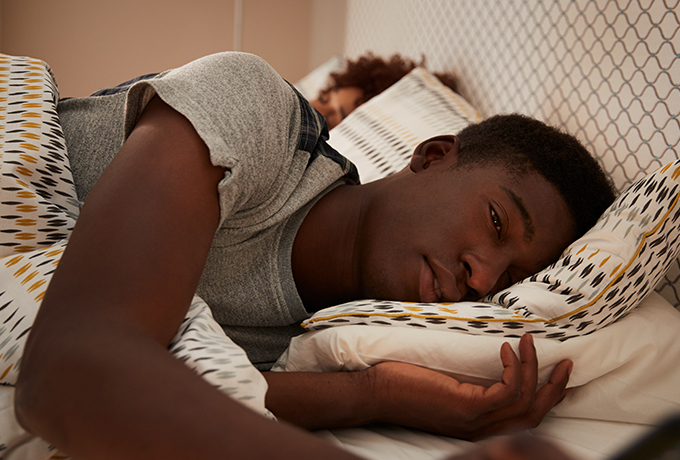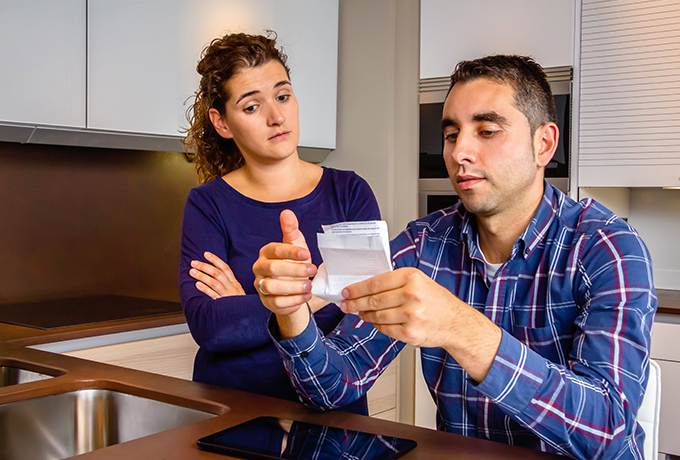Feeling stressed out and how to get help
You know what stress is. But what causes stress, and how can you better manage it?
Read moreYour mental health, physical health, quality of life and safety is reliant on you getting enough sleep. During sleep, your body works to support healthy brain function and maintain your physical wellbeing. Sleep is just as important as a healthy diet and exercise.

Do you have trouble getting to sleep, staying asleep or simply being able to sleep? You’re not alone.
In fact, up to 40% of Australians may be suffering from poor sleep, according to an inquiry on Sleep Health Awareness in Australia. Chronic sleep symptoms (e.g. trouble falling asleep, waking up too early), can affect our ability to live a healthy, happy life.
So, if fatigue, irritability, inability to concentrate or especially if a lack of shut eye is making you feel anxious or stressed – read on.
Most Australians sleep for between seven and eight hours a night, and the recommended amount for 18 to 64 year olds is seven to nine hours, according Australia’s Sleep Health Foundation.
Your mental health, physical health, quality of life and safety is reliant on you getting enough of it. This is because during sleep your body works to support healthy brain function and maintain your physical wellbeing.
The best way to think of it – sleep is just as important as a healthy diet and exercise.
If you don’t get enough, your body’s biological processes become disrupted. The damage from sleep deficiency can occur in an instant, or it can cause harm over time. For example, ongoing sleep deficiency can raise your risk for some chronic health problems such as obesity, heart disease, kidney disease, stroke and diabetes. It can also affect how your brain works, including how well you think, react, work, learn and get along with others, reports the National Heart, Lung and Blood Institute.
It is natural to be experiencing sleep difficulties. Fear, anxiety, isolation, greater family and work stress can all contribute to poor sleep.
Harvard Medical School reports, sleep deprivation affects your psychological state and mental health – and, those with mental health concerns are more likely to have insomnia or other sleep disorders.
Scientists have also discovered that sleep disruption affects levels of neurotransmitters and stress hormones in your brain, which may impair your emotional regulation.
Studies using different methods and populations estimate that 65 to 90 per cent of adult patients with major depression, experience some kind of sleep problem.
Sleep problems may also affect people with generalised anxiety disorder, particularly those with post-traumatic stress disorder (PTSD), and may occur in panic disorder, obsessive-compulsive disorder and phobias.
Stepping in early, if you think a sleep issue is developing – particularly if it’s affecting your mental health – is important. Treating a sleep disorder may help alleviate symptoms of a mental health problem.
There’s no doubt sleep is vital for maintaining your physical and mental health. But remember, there are many others who also find sleep difficult and you’re not alone if you seek help for ways to sleep better.
Don’t let it build up. SuicideLine Victoria is a free 24/7 telephone and online counselling service offering professional support to people who are concerned about their emotional and mental health. Call 1300 651 251. If it is an emergency, call 000.
You know what stress is. But what causes stress, and how can you better manage it?
Read more
Feeling suicidal can be an overwhelming and painful experience, but it is not something you have to bear alone. You can get help. There are services and professionals available to support you through this difficult time.
Read more
Your mental health, physical health, quality of life and safety is reliant on you getting enough sleep. During sleep, your body works to support healthy brain function and maintain your physical wellbeing. Sleep is just as important as a healthy diet and exercise.
Read more
Financial stress arises when there is a mismatch between your income and expenses, which leads to worry, anxiety, and uncertainty. Learn more about the signs of financial stress and how to cope.
Read more